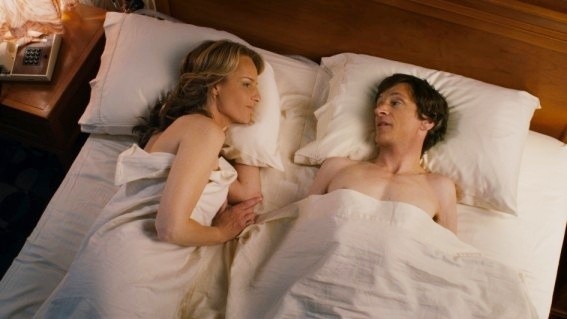15, 2012, Directed by Ben Affleck
Starring: Ben Affleck, John Goodman, Bryan Cranston, Alan Arkin
There comes a moment in Argo, Ben Affleck's third stint behind the camera, where feeling relaxed in your cinema seat will become something of a distant memory. This feeling will inevitably be followed by clammy hands, a speedy heartbeat and seat-shuffling galore, topped off with a silent affirmation for Affleck's credibility as director. If none of the above applies - Argo, for you, is a write-off; a genre-stabbing mash-up of striking cinematic genres that offers a slim amount of originality. If that's the case, then with all due respect, more fool you.
Six members of the US embassy are forced into hiding in Tehran during the 1979 Iranian Revolution, holed up in the Canadian embassy for months after their building is stormed by rioters. With the CIA at a loss of how to extract the American’s out undetected, the CIA’s ‘exfiltrator’ Tony Mendez (Affleck takes starring role, levelling it out with full 70s hairdo) propose an out-there plan: they use their Hollywood contacts to announce production on Argo, a science-fiction adventure that transforms him into hotshot producer who must fly to Iran to scout locations for the shoot. Code for: smuggle the American’s out of the country paraded as Argo’s film crew. A script-reading and Variety article later, Argo is go. As Breaking Bad's Bryan Cranston admits, 'It's the best worst idea we have.'
Six members of the US embassy are forced into hiding in Tehran during the 1979 Iranian Revolution, holed up in the Canadian embassy for months after their building is stormed by rioters. With the CIA at a loss of how to extract the American’s out undetected, the CIA’s ‘exfiltrator’ Tony Mendez (Affleck takes starring role, levelling it out with full 70s hairdo) propose an out-there plan: they use their Hollywood contacts to announce production on Argo, a science-fiction adventure that transforms him into hotshot producer who must fly to Iran to scout locations for the shoot. Code for: smuggle the American’s out of the country paraded as Argo’s film crew. A script-reading and Variety article later, Argo is go. As Breaking Bad's Bryan Cranston admits, 'It's the best worst idea we have.'
Kicking things off in fifth gear, setting up the US embassy’s situation, once the film’s pace slows to allow for the story to present itself, you'll feel deeply embroiled in the 70s aesthetic that is pulled off well. The cinematography, the colour palette - even the old-school Warner Bros logo used as the film begins stays in your mind. Somewhat more strikingly, as the film finds its footing, the political genre becomes Affleck’s focal point. Contrast these All the President's Men-esque office-rushing and intel-sharing scenes with the ensuing movie industry satire that follows (think Get Shorty with John Goodman and Alan Arkin as a director/producer duo – magic combo,) it is surprising how little this alienates, and instead how accessible the plot transition becomes; crucially never playing it for laughs, the two slot in rather well. Their delivery ensures no need for the script to strive for the comedy. It all comes natural. It's no less of a credit to Affleck as a filmmaker though that he knows when to leave the lightheartedness behind, and delve headfirst into the matter at hand. The guy proves with confidence that he knows how to give a good go at several genres in one audacious feature, but also is savvy enough to know when to move swiftly on when you could assume you’re onto a winner.
Once the extraction mission is in full swing, the tension heightens to mind-blowing heights. Although the crew are severely underdeveloped, you never once fear any less for these characters that Mendez is attempting to rescue. In a film where the line of good and evil is pretty plain to see, Affleck refuses to insult the intelligence of the viewer, opting instead to direct with a panache so discreet that it's always clear what's occurring. Fundamentally, whichever opinion is formed, it all boils down to one common hope between the nail-chewing audience members: let them get home safely.
If characterisation was applied successfully - namely to Mendez and his family relationship that unfortunately adds nothing when an attempt is made at carving out some form of dynamic between he and his son - Argo could have been sublime. It just falls short. The final stretch may come under fire for being drawn out, extending the running time for a bit too long. As it is, it's doubtful you'll experience as tense a final third for quite a while, with the editing of Affleck's brilliantly-captured scenes doing everything that needs to be done. After acclaim for previous films Gone Baby Gone and The Town, all eyes were on this film to be the clincher. Ben Affleck nails it once again, further proving - and maybe removing all doubt in the process - that he is a truly gifted maker of films.
4.5/5
Readmore...



